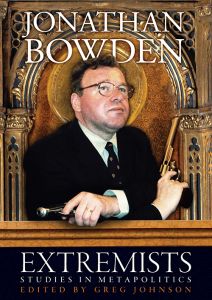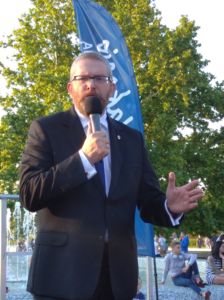The Guy Who Used a Fire Extinguisher on a Hanukkiah: Who Is Grzegorz Braun?
1,552 words
Now there is a Pole memed round the world . . . On the December 12, 2023, Polish MP Grzegorz Braun used a fire extinguisher to put out the lights on a hanukkiah (incorrectly referred to as a menorah in most reports) in the Polish Parliament. The questions everyone on the dissident Right are asking are how did that happen, and is Grzegorz Braun our guy? Just to spoil the fun for everyone right away: no, he is not our guy, and his intentions were not 100% “red-pilled.” Probably the best comparison we can make to anglosphere politics is to say that Braun is a “Catholic Alex Jones” of sorts. Nevertheless, let us shed some light on this (in)famous figure of Polish politics.

Grzegorz Braun was born in 1967 in Toruń, Poland, but spent his youth in Wrocław, which in the 1980s was one of the strongholds of the Polish anti-Communist groups that were connected with the famous Solidarność (Solidarity) movement. Braun was involved with the more radical fractions of this movement, including Pomarańczowa Alternatywa (Orange Alternative) — a counter-cultural anti-Communist initiative which used absurdist humor to make fun of the Communist regime. He also had ties to Solidarność Walcząca (Fighting Solidarity), the largest radical anti-Communist organization, which was a consistently anti-Communist and anti-Soviet movement that demanded no compromise with the Communists, total political revolution in Poland, freedom for all nations enslaved by Communism, and the dissolution of the Soviet Union and the Warsaw Pact. The leader of Fighting Solidarity was Kornel Morawiecki, a legend of Polish anti-Communism, whose son, Mateusz Morawieck, later became Poland’s Prime Minister in the recently-ended Prawo i Sprawiedliwość (Law and Justice) government. Despite of all the badmouthing of the Morawiecki government by Braun, they knew each other during their 1980s anti-communist activities and used to be on rather friendly terms.
To understand some of Grzegorz Braun’s later activities, you need to know a bit about his family background. He comes from the famous Braun family, who are part of the Polish patriotic intelligentsia that had been involved in the Polish independence movement since the nineteenth century. (Contrary to some rumors I have read on Telegram, they are not Jewish and “Braun” is not a Jewish last name.) Braun’s great-grandparents were Karol and Henryka Braun, pioneers of the Sokol and Scout movements in Poland. All four of their children were prominent Polish patriots: Kazimierz was a Polish officer, who was awarded the Virtuti Militari (the highest Polish military decoration); Jerzy was a writer, Catholic philosopher, and a scout who was imprisoned by the Polish Communists; Jadwiga was an actress and a teacher who was also an officer in the Polish army; and finally, Juliusz was a lawyer and a professor. Juliusz’s son Kazimierz became a famous theater director and an academic whose three children — Monika, Justyna, and the (in)famous Grzegorz — all became involved with the arts and the academic world. All of the Braun family are representatives of the Polish Catholic intelligentsia, who supported the Polish anti-Communist movement. But they were not representatives of the most conservative faction, which means that they were supporters of the mainstream within the Polish anti-Communist Solidarity.

You can buy Jonathan Bowden’s Extremists: Studies in Metapolitics here.
As should be clear, from the very start Grzegorz Braun was predestined to become an important figure in Poland’s public life. He has used his position well, having become a very interesting director of documentary films in the late 1990s and early 2000s. His films focused on important Rightist and conservative figures in Polish culture, and later on analyzing the anti-national and genocidal aspects of the Communist system, in Poland and in the whole Soviet bloc. His documentaries were really great to watch, with well-researched scripts, very modern and fast-paced montages, and an interesting use of music, sound effects, and animations. They were truly ahead of their time, and for me and my friends from my generation, the premiere of each of his films were important events. This was well before YouTube. One of the highlights of his films is the narration by the director himself, who has a powerful voice and is extremely skilled with words.
But Braun quickly learned to play the role of his family’s enfant terrible. While the Braun family was anti-Communist, patriotic, and Catholic, albeit rather moderate, Grzegorz began to become more and more radical with each film and with every public speech. This seemed to go in an interesting direction when he became unofficially involved with some of Poland’s nationalist organizations. Unfortunately, he quickly discovered conspiracy theories and moved toward the fringe Right and various “alternative” groups. He also quickly learned that posting short commentaries on YouTube brings you more attention and is less exhausting than making documentaries. Braun also became involved with the infamous Janusz Korwin-Mikke; I know that outside of Poland he is considered an interesting figure who tosses red pills during public events, but in Poland we consider him as a demented old man who stutters about such things as the positive aspects of pedophilia — this is unfortunately not an exaggeration — and whose life goal is to ridicule the Right-wing scene in Poland.
Grzegorz Braun decided to ride the wave of Internet fame, and after a few failed attempts to enter politics he finally joined the Konfederacja (Confederacy) movement and entered the Polish Parliament in 2019. He soon founded his own party, Konfederacja Korony Polskiej (Confederacy of the Polish Crown). While Konfederacja is a federation of various conspiracy theorists, including those who want to ban abortion and legalize marijuana (sic!), Braun’s Konfederacja Korony Polskiej is in a league of idiocy of its own, including propagating a plan to reinstate the Polish monarchy (with Jesus as the actual monarch) after taking over the army in a civil war.
Konfederacja is often presented as a nationalist or Rightist movement in the media, but this is not true. They have made a living out of being contrarians, meaning that they are against any issue on which there is a consensus among the larger Polish political parties (and Polish society), thus gaining a steady flow of over 5% of fringe voters, thereby securing parliamentary seats (and salaries). Thus, they are against Poland supporting Ukraine in the war, against vaccines and lockdowns, against using car seat belts, and so on. But if the consensus in Polish politics and Polish society changed on any of these issues, they would change their views overnight. I will be blunt here, especially having known some of these people personally: They do not have any firm views on anything, they have simply learned to make good money on appealing to the fringe elements of Polish society. But they are also quite harmful, given that they have supported the introduction of article 256 of the Polish penal code, which is basically anti-nationalist “hate speech” legislation — because this would somehow weaken the liberals in Poland . . .
Since entering the Polish Parliament, Grzegorz Braun has become one of the most tiresome figures in Polish politics. He has something to say about everything and goes on extremely long tirades anywhere he appears. The main problem with him is that he has descended into apparent madness, for instance by claiming to believe that the planned construction of Poland’s largest airport is in fact a cover-up for creating a secret base for the Israeli government (sic!), claiming that “the democrats are the real Nazis,” and so on. Braun is also a fan of playing 4-D chess, believing that Orthodox, neo-Communist Russia, which has had the harshest COVID measures in Europe, is somehow a Catholic, anti-Communist, no-lockdown utopia. Another problem with him is that he has become a terrible narcissist who goes nuts when the spotlight is not on him. During the Mateusz Morawiecki government’s inauguration, he became the center of attention by blocking the Prime Minister’s speech. Now, during the inauguration of the new Donald Tusk government, he shifted the spotlight onto himself by extinguishing the hanukkiah. Let us add that two years ago, he removed a Christmas tree from one of the courts to protest against anti-Catholic policies, because of “reasons” . . .
To sum it all up: Grzegorz Braun is not “our guy,” but rather a narcissistic politician who makes a living from conspiracy theories — and probably believes them. He used to be an interesting Rightist filmmaker, but this is no longer the case. And when it comes to “fire-extinguisher-gate,” I do not think that there is any place for Hanukkah celebrations in the Polish Parliament, and I don’t care if anyone uses a fire extinguisher to stop them. But from our perspective, Braun did not have good intentions when doing this — he believes in the conspiracy theory about Jews not being the “real Jews,” and that evil psuedo-Jewish “Satanic talmudists” stole “muh real Old Testament” from “muh real, good Jews.” He also mumbled some third-worldist nonsense about “muh Palestnian children.”
The good thing is that we now have a steady flow of memes entering the Polish mainstream, with most of society having rather “based” fun with the whole event. Most of our people — apart from the fringe liberals and Leftists — agree that the Polish Parliament is not a place to have Hanukkah celebrations. But let us end with the sad remark that it was the Polish conservatives who instated these celebrations in Parliament — because on a 4-D chessboard, it somehow strengthens Polish patriotic traditions.




